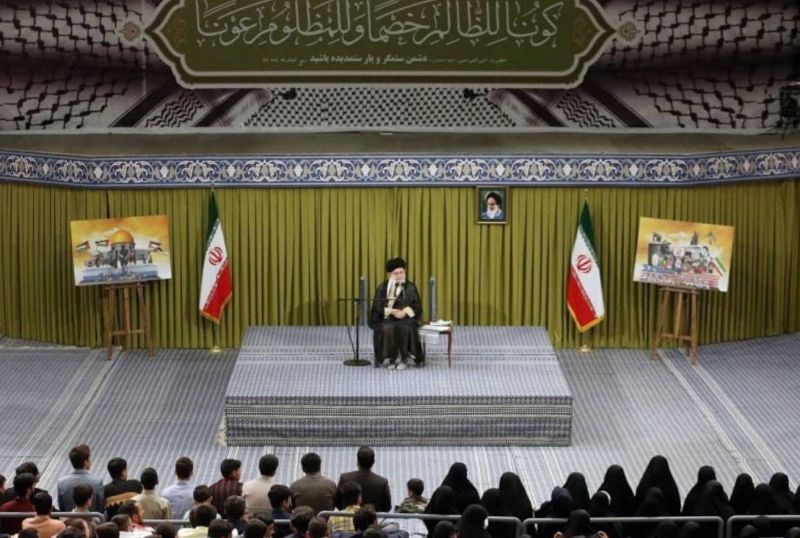
Iran's Supreme Leader Ayatollah Ali Khamenei gives a speech to students in Tehran, November 1, 2023. (Credit: AFP/HO/KHAMENEI.IR)
While the Islamic Republic officially denied involvement in the Oct. 7 attack on Israel, various Iranian sources have claimed to media outlets that Tehran planned the al-Aqsa Flood operation in coordination with Hezbollah and Hamas.
In recent weeks, regional auxiliaries of the Iran-led “resistance axis” have stepped up attacks on Israel and US points of interest in Syria and Iraq, actions that could drag the region into full-scale conflict.
At the same time, the players involved seem determined to avoid a scenario of region-wide war, although they have fallen short of clearly defining the red lines..
We spoke to Ali Alfoneh, a researcher at the Arab Gulf States Institute in Washington, about Iran’s role in the Hamas-Israel war.
Q- What role is Iran playing in the Gaza conflict? To what extent are Iranian auxiliaries autonomous in the region?
A- Iranian officials openly admitted that their country provides financial aid to Hamas, and Iran’s supreme leader Ayatollah Ali Khamenei publicly praised the Oct. 7 Hamas incursion into Israel. It’s not hard to discern the link: the incursion is the reason why Iran is funding Hamas.
All the Middle Eastern states have either used, are currently using, or will use non-state “proxies” in the future to defend their interests. Each state has developed its own management style vis-a-vis its proxies. Arab countries generally take a laissez-faire approach to their proxies - sometimes resulting in disasters like the Sept. 11, 2001 attacks. Israel and Iran, on the other hand, are usually more closely involved in the management of groups affiliated with them. To complicate matters further, some auxiliaries enjoy greater autonomy than others. Those with varied funding sources, arms supplies, logistical support and so on are less likely to be micromanaged by their sponsors.
As far as Hezbollah and its role in the Gaza war is concerned, my impression is that neither Iran nor Hezbollah’s leaders want to involve Lebanon in the conflict. It is more likely that Hezbollah’s role in Iran’s defense doctrine is to dissuade the Israelis from bombing Iran’s nuclear facilities. Why should Iran forgo such a deterrent in favor of Gaza and Hamas, which are easier to sacrifice?
Q- The red lines vaguely defined by the “resistance axis,” such as an Israeli massive ground offensive or the continued suffering of the Palestinians, seem to have been crossed without provoking a major reaction. What are Iran’s objectives?
A- The Islamic Republic has no red lines when it comes to Hamas or the Palestinian people. From Iran’s point of view, Hamas is just a disposable pawn in the grand chess game against Israel, and the Palestinian people are a collateral element. Iran achieved all its objectives on the first day of the war, Oct.7: a possible Israeli-Saudi agreement to normalize their diplomatic relations, which Iran opposes, has been postponed indefinitely. The Iranian military and security services have suffered many humiliations at the hands of Mossad. As a long-standing supporter of Hamas, Iran is happy to take some credit, remotely and with a certain denial of responsibility, for taking revenge on Israel by carrying out a surprise attack on Israeli territory on an unprecedented scale since the October 1973 war. Above all, the Hamas incursion into Israel shattered the myth of the invincibility of the Jewish state, whose Iron Dome and concrete walls pushed it to abandon the idea of peace with the Palestinians as a precondition for the normalization of diplomatic relations with its Arab neighbors.
Q- With a growing number of strikes by pro-Iranian groups in recent weeks, particularly against US interests, could Iran find itself at the heart of a confrontation with the US?
A- For the moment, there is no direct threat of attack against the Islamic Republic. Iran claims not to have been involved in the Hamas incursion into Israel on Oct.7, and the US and Israel are pretending to believe it! In other words, none of the players seem interested in expanding the Gaza war. However, the Islamic Republic is keen to complicate the calculations of Israel and the US, which explains the small incidents on the Israeli-Lebanese border and other minor incidents involving Iranian proxies in Yemen and Iraq.
This article was originally published in French in L'Orient-Le Jour. Translation by Joelle El Khoury.